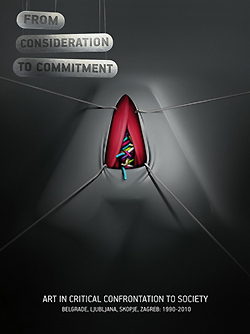From Consideration to Commitment: Art in Critical Confrontation to Society (Belgrade, Ljubljana, Skopje, Zagreb: 1990-2010) (2011) [multiling]
Filed under book | Tags: · 1990s, 2000s, art, art criticism, contemporary art, croatia, ex-yugoslavia, macedonia, serbia, slovenia, video art

The publication explores practices of critical contemporary fine arts – practices of research, progressive and experimental actions by contemporary fine artists from the 1990s to the present, in four countries in the region – Croatia, Macedonia, Serbia and Slovenia. These are practices which focus on issues such as identity aspects (national, cultural, religious, ethnic), workers’ rights, social integration of minorities, global market fluctuation trends and its impact in the local context, unscrupulousness of capital, the position of women, spatial devastation, art institution system issues, and many others.
The publication maps out and theoretically reviews critical and research practices, and contemporary fine arts practices oriented towards the contemporary civilization moment, which have been active in the context of the independent cultural scene since the 1990s, but which have also been present in the institutional frame. The authors provide only drafts of the political, social, economic and cultural changes of the local contexts, through four segments, due to a lack of space. Each segment focuses on the practices and context of a given country, i.e. the capital as the primary focus, and in addition to the introductory word by the authors, it includes interviews (with authors, theorists, curators, organizers…) who contribute to the recording of these artistic practices based on their experience, work and knowledge.
The segments deal with the Belgrade, Ljubljana, Skopje, and Zagreb scenes. All the authors devised their approaches in an effort to present the fruitful and creative production of these cities, to the greatest extent possible.
Contemporary visual art is discussed through the works and experiences of Igor Grubić, Sanja Iveković, Andreja Kulunčić and Darko Šimičić (Croatia), Stevan Vuković, Milica Tomić, Danilo Prnjat and Živko Grozdanić Gera (Serbia), Neven Korda, Marko Peljhan, Marija Mojca Pungerčar and Maja Smrekar (Slovenia), and Bojan Ivanov, Zoran Poposki, Mira Gakina and Žaneta Vangeli (Macedonia).
The book was conceived as a multilingual publication in English, in addition to the local languages (Croatia, Macedonian, Serbian and Slovenian).
Realized as part of the project Let’s Talk Critic Arts.
Editorial Board: Dušan Dovč, Vesna Milosavljević, Jasna Soptrajanova and Dea Vidović
Authors: Jasna Jakšić – in cooperation with Tihana Bertek, Maja Gujinović, Ana Kovačić, Srđan Latreza, Petra Novak, Tina Novak, Tamara Sertić and Leda Sutlović (Croatia); Nebojša Vilić (Macedonia); Miha Colner and Nika Grabar (Slovenia); Vesna Tašić – in cooperation with Vesna Milosavljević and Miroljub Marjanović (Serbia)
Publishers: SEEcult.org in cooperation with ForumSkopje; Kurziv – Platform for Matters of Culture, Media and Society; SCCA, Center for Contemporary Arts – Ljubljana / Artservis; The Association of NGOs Clubture
Published in April 2011, Belgrade, Ljubljana, Zagreb, Skopje
611 pages
This work is made available by the Creative Commons Licence Attribution-NonCommercial-ShareAlike 3.0 Unported unless not stated differently.
Radical Education Collective (eds.): New Public Spaces: Dissensual Political and Artistic Practices in the Post-Yugoslav Context (2009)
Filed under book | Tags: · activism, art, capitalism, democracy, education, ex-yugoslavia, kosovo, politics, protest, public space, public sphere, resistance, slovenia

New public spaces: dissensual political and aesthetical practices in the post-Yugoslav context is a reader edited by a Radical Education Collective from Ljubljana (Gal Kirn, Gasper Kralj and Bojana Piskur). It drew its inspiration from encounters and conversations with activists, artists, critical thinkers, curators, militant researchers and writers from Belgrade, Helsinki, Istanbul, Ljubljana, London, Pristina and Prizren in April and May 2008 at the social centre ROG and the AKC Metelkova mesto in Ljubljana. Those encounters challenged not only the distinction between ‘serious’ discussions and ‘informal’ debates – that instantly reproduce linear time and hierarchical space – but also our mutual ability to listen, talk and share experiences (instead of consume information). Contributions were subsequently elaborated into the reader, which consists of two parts. In the first part, engaged collectives reflect on the organisation of different political issues: from anti-capitalist and student struggles, to immigrant workers and the re-appropriation of public spaces in the region. The second part focuses on specific art collectives from Kosovo and Ljubljana, which are occupied with the question of space: why was space so important when rethinking the relation between art and politics, and also what can one do with the space? Here, a set of political practices enabled art collective to undermine the presupposed liberal border between public and private. The reader concludes with a presentation of some art projects that intervened and articulated spatial and visual transformations in the post-Yugoslav context.
Authors and contributors: Barbara Beznec, Sezgin Boynik, Ibrahim Ćurić, Cornelia Durka, Janna Graham, Minna Henriksson, Gal Kirn, Gašper Kralj, Andreja Kulunčić, Andrej Kurnik, Polona Mozetič, Said Mujić, Osman Pezić, Bojana Piškur, Marjetica Potrč, Tjaša Pureber, Radical Education Collective, TEMP, Darij Zadnikar, Antonios Vradis
Edited and compiled by: Gal Kirn, Gašper Kralj, Bojana Piškur
Published by Jan van Eyck Academie, Maastricht (NL), Modern Galerija, Ljubljana / Museum of Modern Art, July 2009
ISBN 978–90–72076–87–8
PDF (updated on 2025-1-24)
PDFs

